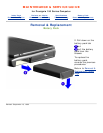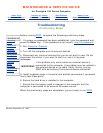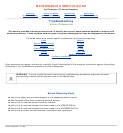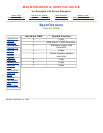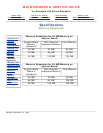
MAINTENANCE & SERVICE GUIDE
for Prosignia 150 Series Computer
Index Page Preface -or- Notice Specifications Battery Pack
Product Description Illustrated Parts Catalog Troubleshooting Removal & Replacement
Troubleshooting
Solving PC Card Problems
Listed in the following tables are some common causes and solutions for PC Card problems:
Solving PC Card Problems
Problem Probable Cause Solution(s)
When turned on, the
computer does not beep
when a PC Card is inserted.
Card is not inserted
properly.
PC Card beeps are disabled.
Ensure the card is inserted
in the correct orientation.
Double-click the PC Card
icon in the Control Panel,
click the Global Settings
tab, the enable PC Card
sound effects.
Speaker is turned off or
volume is turned down.
Press volume buttons to
turn the speaker on, then
increase the volume.
PC Card drivers are not
installed.
Double click the Add New
Hardware icon in the
Control Panel for
installation instructions.
If PC Card or drivers are
not compatible with
Windows, install drivers
and use the PC Card in
MS-DOS mode.
Card or card driver is not
supported.
Contact your Compaq
authorized service provider
for a list of PC Cards
tested successfully in
Compaq PC Card
platforms.
PC Card modem, fax, or
network card does not work.
Card is not fully inserted
into the slot or is not
inserted properly.
Ensure the card is inserted
in the correct orientation.
Telephone cord is not
plugged in all the way.
Check and secure
telephone connection.
Necessary drivers are not
installed (turned on).
Install drivers.
PC Card modem or fax card
does not work.
You are trying to access the
card using the wrong COM
port.
See Specifications to verify
COM port.
The card conflicts with a
serial device.
See Specifications to verify
address.
The card is not supported. Use supported cards only.
Modem network PC Card does not
work.
Network driver is not installed
or is not set up properly.
Install driver.
Telephone cord is not properly
connected.
Verify telephone connection.
Memory or storage card does
not work.
SRAM and flash memory cards
require the memory card
driver to be loaded (turned
on).
Flash memory cards require
the Microsoft FlashFile System
to be loaded.
Hard drives on flash
mass storage cards require the
PC Card ATA driver to
be loaded.
Install driver.
You are trying to access the
hard drive card using the
wrong drive letter.
Double-click My Computer to verify the
drive letter assigned to the card.
The card is not
supported.
Contact your Compaq authorized service
provider for a list of PC Cards tested
successfully in Compaq PC Card platforms.
Solving Power Problems
Also see "Solving Battery and Battery Gauge Problems" in this section.
Solving Power Problems
Problem Probable Cause Solution(s)
Computer won't turn on and
battery pack is not inserted.
Computer is not connected
to a power source.
Power cords to the
external
power source are
unplugged.
Insert battery or
connect an external
power source.
Ensure that power cords
connecting the
computer and the
external power source
are plugged in properly.
Power adapter is defective. Replace AC Adapter and
restart.
Computer turned off while it was
left unattended and the power
icon is off.
System board is defective. Replace the system
board.
System initiated
Hibernation due to a
critical low-battery
condition.
Replace the battery
pack with a fully
charged battery pack or
connect the computer to
an external power
source. Then turn on
the computer.
System initiated
Hibernation after a preset
timeout.
Turn on the computer.
Solving Printer Problems
If you experience problems printing, run a printer self-test. Refer to the documentation provided with your printer for
instructions.
If the self-test fails, it is a printer-specific problem. Also refer to the printing section of your application documentation.
Solving Printer Problems
Problem Probable Cause Solution(s)
Printer will not turn
on.
The signal cable may not be
connected properly, or the printer is
unplugged.
Ensure that the signal
cable is properly
connected and that the
power cord is connected to
the electrical outlet.
Printer will not print.
Printer is not turned on or is off
line.
Turn the printer on and set
it to on line.
The device drivers for your
application are not installed.
Refer to the printer
documentation to install
the correct printer driver.
Printer that is set up for a network
is not connected to the network.
Connect the printer to the
network.
Printer cable is too long,
unshielded, or defective.
Replace the cable.
Paper tray is empty.
Fill the paper tray with
paper and set the printer
to online.
Printer prints garbled
information.
Correct printer drivers are not
installed.
Refer to the printer
documentation to install
the correct printer driver.
Cable is not connected properly.
Ensure that the printer
signal cable is properly
connected to the
computer.
Cable is defective.
Replace the printer cable
and retest.
Solving Touch Pad/Pointing Device Problems
Some common causes and solutions for Touch Pad/pointing device problems are listed in the following table.
Solving Touch Pad/Pointing Device Problems
Problem Cause Solution(s)
Touch Pad or mouse does not
work.
Incorrect or no device
driver is installed.
Install the device driver
and add to the
AUTOEXEC.BAT file or
CONFIG.SYS file.
The device driver is not
installed in Windows.
Install the Touch
Pad/mouse driver in
Windows.
External mouse does not work. Mouse is not securely
connected or is connected
to an incorrect external
connector.
Ensure that the mouse
is securely connected to
the appropriate external
connector.
Touch Pad or mouse does not
work even though the device is
enabled in Windows.
Mouse is not enabled. Enter MOUSE at the
system prompt to
activate the mouse
device driver.
Add a line in the
AUTOEXEC.BAT file to
automatically activate
the mouse device driver
each time computer is
turned on or restarted.
Cable not properly seated in
Touch Pad board.
Reseat cable.
Defective Touch Pad board. Replace Touch Pad
board.
Defective system board. Replace system board.
Device driver is not
correctly installed in
Windows.
Install the appropriate
device driver in
Windows.
Cursor skips or moves
abnormally when using the
Touch Pad.
The Touch Pad needs to be
cleaned.
Clean the Touch Pad
with a cloth dampened
with alcohol or an
ammonia-based glass
cleaner. Wipe up liquid
with a dry cloth.
Revised: September 16, 1999



